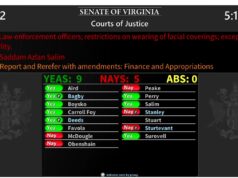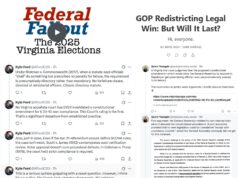Leonard A. Bennett, Newport News; Consumer Litigation Associates, P.C., VSB Pro Bono Law Firm of the year, 2019
Virginia’s consumer protection laws are amongst the weakest in the nation, with the interest rates imposed on Virginians by predatory lenders – particularly auto title lenders and a new breed of “online” lenders – at or near the highest. These lenders target our most vulnerable. Discovery in one case brought against a business member of a dark organization pushing these loans, the Online Lenders Alliance, determined that the lender would most profitably target single mothers. Predatory lenders target consumers of color. And in my community, Hampton Roads, young servicemembers and their families have become recurring victims.
In 2017, Virginians took out payday loans totaling nearly $123 million, with an average APR of 254%. Car title loans are just as bad. According to data that licensed lenders report to the Virginia Bureau of Financial Institutions, the average title loan in Virginia of $1,116 has a repayment of $2,700 over 12 months. More than 122,000 Virginians took out approximately $155 million in car title loans in 2017, and nearly 12,000 Virginians – one in ten – had their cars repossessed and sold for inability to repay a car title loan. Online lenders charge over 400% interest, with direct access out of the consumer’s bank account. Open-end credit lenders and those gaming a loan amount to get around the narrow small-dollar lending law restrictions have charged $16,000 over 12-months, for a loan of just $7,000. All of these loans are indefensible.
As Attorney General Mark Herring has warned, “Predatory lenders are exploitative and wrong but unfortunately too many Virginians find themselves turning to them when they fall on hard financial times.”[1] Herring was properly angered and embarrassed that Virginia has become known as the “predatory-lending capital of the East Coast.”[2]
Because of only limited help from our legislature, consumer advocates in this fight, including our Attorney General, have had to rely on the courts to battle this disease. Real legislative change – modest change – has been impossible to enact, and until now has remained bottled up in the House of Delegates and Senate Commerce Committees, where predatory lending lobbyists have befriended and convinced some of its leaders to adopt an aggressive anti-regulatory creed not even believed in more conservative states.
Remarkably, the lobbyists and industry groups leading the fight to prevent lending guardrails, the members of the Online Lenders Alliance and large-dollar, far-right backer Advance Financial,[3] are the very same businesses that are in active litigation or have suffered litigation losses to our Commonwealth and in lawsuits brought by consumers.[4] Advance Financial, itself seeking influence in Richmond directly as well as through the OLA, is one of the largest funders, with the Treasurer of the group fighting to roll back Arizona’s minimum wage increase, a cruel way to ensure a willing predatory lending borrower.[5]
Virginia voters view defending predatory lending as terrible politics. A post-election poll found that 84% of voters want to see interest rates capped at levels lower than today’s average APRs of 251% for payday loans and 217% for title loans. Unsurprisingly, just 2% of voters view payday lenders favorably. Respected business groups such as the Hampton Roads Chamber of Commerce and legitimate banks and lenders recognize the folly of that approach. They support a 36 percent interest rate cap because they understand the harm predatory lending has visited on their communities.[6]
It is time for Virginia to join Ohio, Colorado, Arizona and many other states that have acted to end the predatory lending scourge, imposing reasonable regulations on all consumer lenders as a way to level the playing field and prohibit dangerous loans – those with impossible rates well beyond the 36% rate limit followed by a plurality of other states.
The Virginia Fairness in Lending Act, SB 421 and HB 789, does just that, implementing a uniform and still profitable interest rate limit of 36% for all consumer loans – payday, auto title, open ended credit or online. All lenders will have the same competitive playing field. This proposed legislation was introduced in both chambers by Del. Lamont Bagby and Sen. Mamie Locke. Its chief co-patrons are other long-time champions on this issue including Senators Jennifer McClellan, Scott Surovell, and Jill Vogel and Delegates Jeff Bourne, Jeion Ward, and Sam Rasoul. Support for this bill comes from legislators from both political parties and every region of the Commonwealth. It is backed by a broad coalition that includes the Virginia Poverty Law Center, Virginia Interfaith Center, Virginia Organizing, faith leaders and local government officials.
The comprehensive legislation is an evidence-based, reasonable approach to the problem that has succeeded at protecting consumers and enabling access to credit in Colorado and Ohio. It addresses any good faith concerns that policymakers may have about maintaining access for consumers with damaged credit. The Pew Charitable Trusts found that the bill would save consumers $100 million each year without reducing their access to credit.
The Attorney General’s office should be commended for coming out strongly in favor of this bill and for their years of work in the trenches fighting against companies who have abused Virginia residents. The bill would strengthen their office’s hand to properly enforce Virginia’s laws at long last.
But it is never that easy. In Richmond, the predatory lending industry, in particular the Online Lenders Alliance, are not only seeking to prevent the Ohio/Colorado solutions, but have drafted alternate legislation that would rollback protections already in place. This counter proposal, introduced through Del. Jay Jones and Sen. Lynwood Lewis would welcome in online lenders currently barred from the state and allow them to make loans up to $5,000 with APRs of 357%. A $3,000 loan over two years would result in more than $16,000 in finance charges. Hopefully, these legislators will reconsider and support consumer leadership in the Senate and House to finally do the right thing.
[1] https://www.oag.state.va.us/media-center/news-releases/1403-march-7-2019-herring-warns-virginians-about-dangers-of-predatory-loans
[2] https://www.washingtonpost.com/local/virginia-politics/va-attorney-general-herring-to-focus-on-predatory-lending/2015/03/26/46a7d23e-d3d3-11e4-ab77-9646eea6a4c7_story.html
[3] https://www.opensecrets.org/orgs/summary.php?id=D000072032&cycle=2020
[4] See e.g. https://www.pilotonline.com/business/consumer/dp-nw-online-lender-settlement-20191212-n7khtxn7tbbsbauzirehwmpgly-story.html
[5] https://prospect.org/power/payday-lenders-suffer-rare-attack-of-honesty/;
[6] https://www.pilotonline.com/opinion/article_2144c91f-31a2-5095-9555-2b794660075a.html



![CNU Wason Center Poll of Virginia: Trump Approval at Just 34%; “narrow majority support a constitutional [redistricting] amendment”](https://bluevirginia.us/wp-content/uploads/2026/01/wason0128-1-238x178.jpg)







